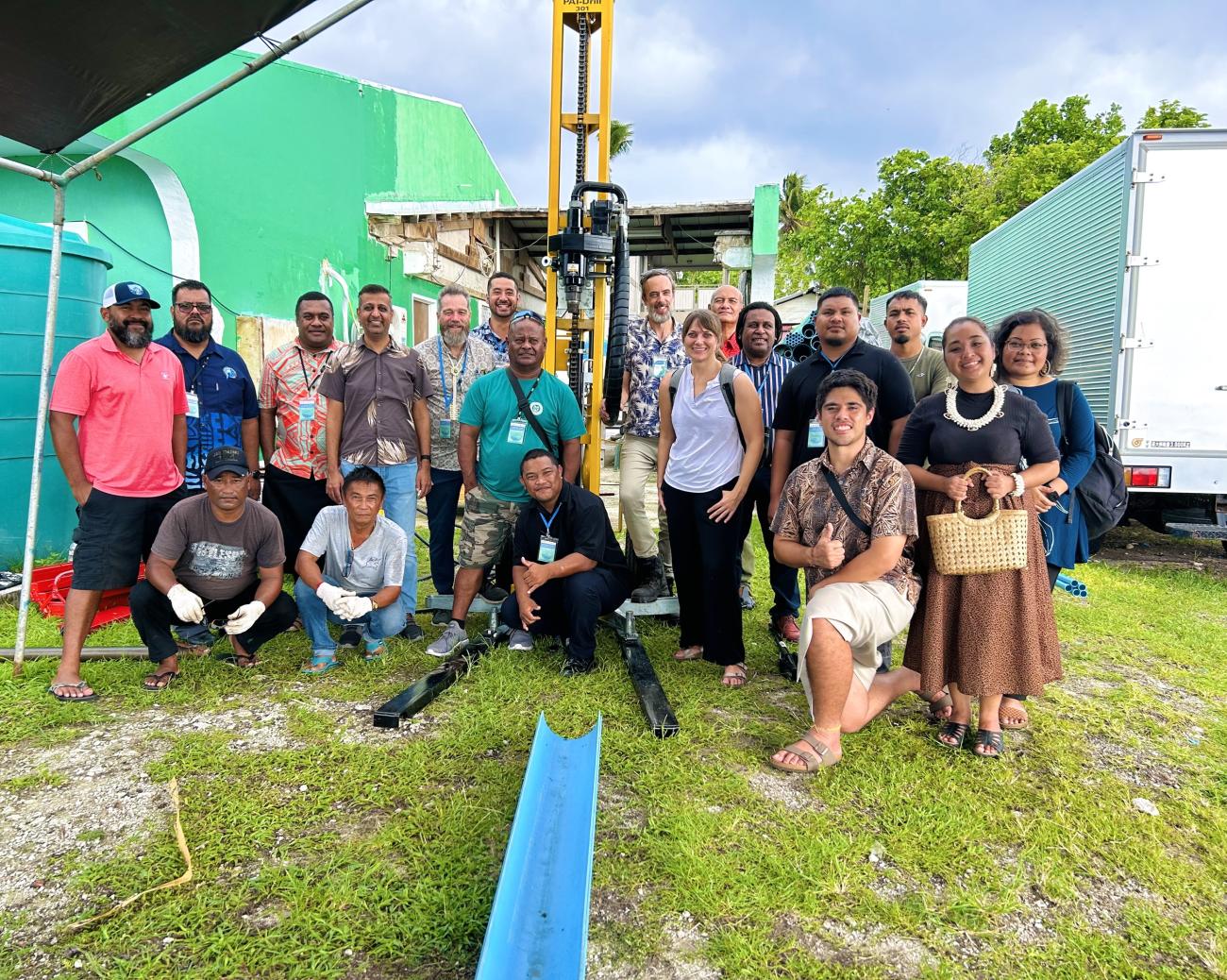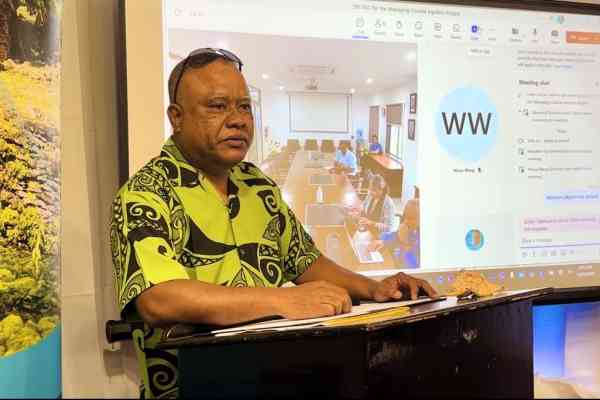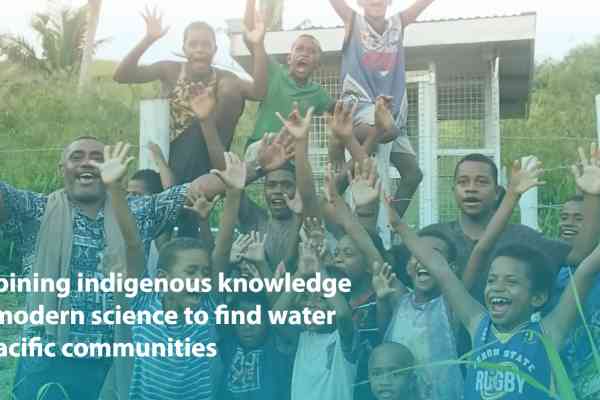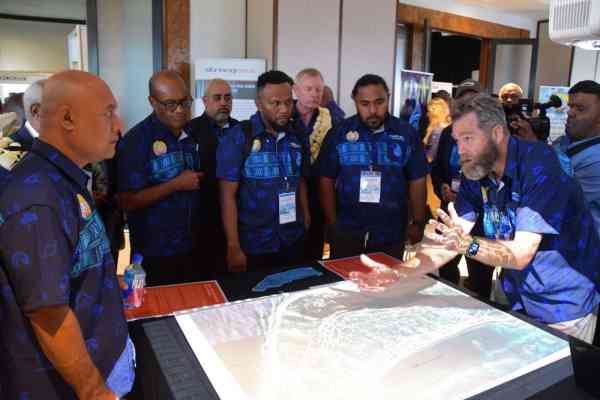Photo: Participants seeing the set-up of the drilling rig used to tap into ground water sources in the atolls
Pacific Island atolls fixed on water security
Small Island Developing States (SIDS) face significant challenges in maintaining freshwater supply, with heavy reliance on ground water from shallow coastal aquifers, and rainwater, to meet their freshwater needs. These important coastal aquifers are however vulnerable to various threats including saltwater intrusion, over-extraction, coastal erosion, and land-use activities, which in turn are compounded by climate change.
Recognising the critical role of these aquifers in climate adaptation, the Managing Coastal Aquifers (MCA) project, that is implemented by the Pacific Community (SPC) and implemented in Tuvalu, Palau and the Marshall Islands, focuses on enhancing the understanding, management, and protection of coastal aquifers to ensure long-term water security.
SPC, in partnership with the United Nations Development Programme (UNDP), hosted the fifth Regional Steering Committee for the Global Environment Facility (GEF) funded - MCA project, in Majuro, Republic of Marhsall Islands (RMI) from May 13 to 17 2024.
The meeting brought together implementing government agency partners from Palau, Tuvalu, and RMI, alongside UNDP and SPC partners, to report on the project progress and chart future activities aimed at supporting the targeted communities.
While giving the keynote address, RMI’s Minister-In-Assistance to the President and Environment, Honourable Bremity Lakjohn, highlighted the seriousness of water scarcity in island atolls, which are most impacted during drought periods.
“As low-lying atoll nations, we share unique challenges. Our population is small, but our geographic area is vast and remote. Our economy is small, logistical costs high, which when considered together create serious barriers to investment at scale. Therefore, the MCA project plays an important role to increase water security and resilience,” said Hon. Lakjohn.
He added, “I hope that this meeting can help to highlight the progress we have all made to date and, equally as important, what is yet to be done to protect groundwater resources from deterioration as well as boost the resilience of the water supply in the outlying atolls and islands.
“We cannot do it alone. We must continue with our partners to deliver not just studies and regional workshops, but also visible results in local communities,” said Hon. Lakjohn.
Sharing similar sentiments was Ms Yemesrach Workie, the Deputy Resident Representative, United Nations Development Programme Pacific Office in Fiji, who discussed significant progress updates since MCA’s last meeting in November 2023, reassuring the project’s commitment to improve water security across SIDS.
She added, “In Tuvalu, RMI and Palau, pre-consultations for the water gallery works are underway. This includes formalising working arrangements for internal storage, material shipment, and construction. Particularly in Tuvalu, consent has been obtained from Nanumea Kaupule (island council) for the construction of the water gallery.”
“Our aim is to accelerate implementation, to ensure beneficiaries, both men and women receive the essential and precious gift of water. Simultaneously, promoting equal knowledge and capacity building, fair participation and fostering sustainable water management,” said Ms. Workie.
Consequently, the one-week agenda focused on fostering practical and interactive discussions aimed at enabling participants to reflect on past experiences, identify emerging challenges, and cultivate innovative solutions for managing coastal aquifers.
In a scheduled field trip, participants visited Laura, a community located in the West of Majuro Atoll, living above an important groundwater source which supports their own community with fresh water and also provides water for approximately 20,000 people in Majuro during times of drought. The Marshall Islands Environmental Protection Authority (RMIEPA) supports implementation work carried out by the MCA project in RMI.
Other substantive discussions that took place focused on Gender Equity and Social Inclusion (GESI) initiatives to be incorporated into project actions such as development of GESI sensitive groundwater education and awareness products to enable island communities of all ages to better understand and engage in water resource management.
SPC’s Geoscience, Energy and Maritime Division Deputy Director, Exsley Taloiburi, reiterated the importance of collaboration and partnerships, which makes the implementation of the MCA project possible across the island atolls.
“Our work requires the support of local communities, island government representatives, relevant national government agencies responsible for water supply, disaster risk management, health, meteorological services and others. Our work in the region has shown that taking an inclusive engagement approach will ensure no one is left behind,” said Mr Taloiburi.
He added, “If we allow collective action to be the beacon of our determination, we can deliver a successful MCA project outcome in our three atoll countries.”
Useful links:



